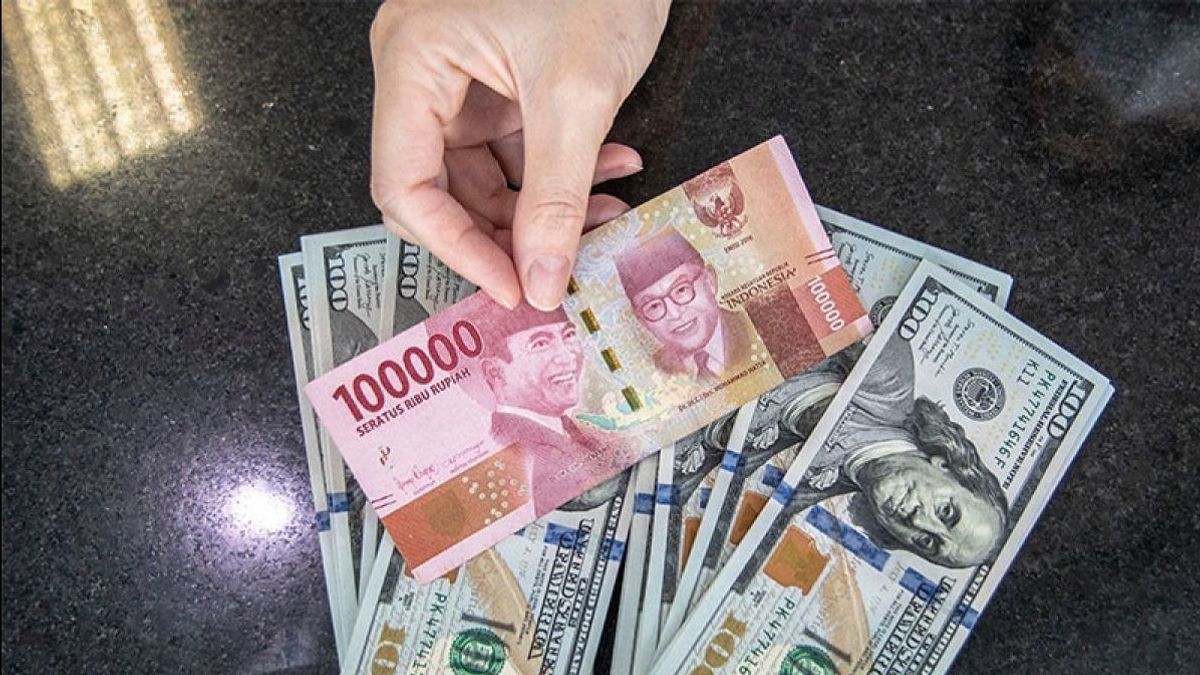JAKARTA - The Ministry of Finance (Kemenkeu) said it would anticipate the impact of the recession of weakening the economic growth of the United States (US) which has also affected the Indonesian economy.
Head of the Fiscal Policy Agency (BKF) of the Ministry of Finance, Febrio Nathan Kacaribu, said that the US economic condition and the potential decline in the Fed interest rate will have a positive effect on economic stability in Indonesia, one of which is the government debt securities market because state securities (SBN) will have an attraction to investors.
According to Febrio, the interest rate of 10-year US securities has already dropped to the level of 3.7. Even the decline was quite sharp in the last few days and helped raise the 10-year SBN tenor interest rate to a level of 6.77 percent. Therefore, if the Fed institutes lowering interest rates, it will have a positive impact on the state debt financing scheme.
"This means that we will see the global dynamics if it does go down because they have to adjust, the impact is positive for us. So that's what we have to make sure and we will guard it," Febrio told the media crew, Tuesday, August 6.
Therefore, Febrio said that the dynamics must be managed properly and ensure that the policies implemented do not have a negative impact on the Indonesian economy.
"We use this to actually improve and create opportunities from our financing structure," he explained.
Previously, the Ministry of Finance (Kemenkeu) noted that the government's debt position had increased as of the end of June 2024 or the first semester of 2024 to reach Rp8,444.87 trillion.
Based on our State Revenue and Expenditure Budget (APBN) document, the government's debt position increased by Rp91.85 trillion or an increase of 1.09 percent when compared to the debt position at the end of May 2024 which amounted to Rp8,353.02 trillion.
With this debt position, the ratio of government debt to Gross Domestic Product (GDP) is 39.13 percent. This figure also increased from the debt-to-GDP ratio in the previous month which was 38.71 percent.
The Ministry of Finance explained that the debt ratio as of the end of June 2024 was consistently maintained below the safe limit of 60 percent of GDP in accordance with Law Number 17 of 2023 concerning State Finance.
"The government manages debt carefully and measurably to achieve an optimal debt portfolio and supports the development of the domestic financial market," the Ministry of Finance wrote in its report, quoted Tuesday, July 30.
In addition, the government prioritizes the procurement of debt with a medium-long period and actively manages debt portfolios.
As of the end of June 2024, the government's debt maturity profile is quite safe with a weighted average maturity (ATM) of 7.98 years.
"The government's discipline in managing debt also supports the results of the assessment of credit rating institutions (S&P, Fitch, Moody's, R&I, and JCR) which to date maintain Indonesia's Sovereignty rating at the investment grade level amid the dynamics of the global economy and the volatility of the financial market," he explained.
In detail, the majority of government debt comes from within the country with a proportion of 71.12 percent. Meanwhile, based on the instrument, the composition of government debt is mostly dominated in the form of Government Securities (SBN) which reached 87.85 percent. Until the end of June 2024, the issuance of SBN of IDR 7,418.76 trillion was divided into domestic SBN and foreign exchange SBN (foreign currency).
Meanwhile, the Domestic SBN was recorded at IDR 5,967.70 trillion, which was divided into Government Securities (SUN) amounting to IDR 4,732.71 trillion and State Sharia Securities (SBSN) amounting to IDR 1,234.99 trillion.
Meanwhile, SBN Valas amounted to Rp1,451.07 trillion, with details, SUN amounted to Rp1,091.63 trillion and SBSN worth Rp359.44 trillion.
SEE ALSO:
As of the end of June 2024, it was recorded that financial institutions held around 41.1 percent of domestic SBN ownership, consisting of 22.1 percent of banks and 19.0 percent of insurance companies and pension funds.
Meanwhile, the ownership of domestic SBN by Bank Indonesia (BI) was recorded at around 23.1 percent, which among other things was used as an instrument for monetary management.
Meanwhile, foreigners are recorded to have a domestic SBN of around 13.9 percent including ownership by the government and foreign central banks. Then the ownership of individual investors in domestic SBN is 8.6 percent.
Furthermore, until the end of June 2024, the government's debt composition instrument from government loan debt contributed 12.15 percent or to Rp1,026.11 trillion. This loan is divided into two categories, namely domestic loans of Rp38.10 trillion and foreign loans of Rp988.01 trillion.
Foreign loans consist of bilateral loans of IDR 263.72 trillion, multilateral loans of IDR 600.47 trillion, and commercial bank loans of IDR 123.83 trillion.
The English, Chinese, Japanese, Arabic, and French versions are automatically generated by the AI. So there may still be inaccuracies in translating, please always see Indonesian as our main language. (system supported by DigitalSiber.id)
















